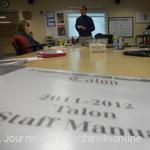There are many stories the world has for us, but also many interpretations
How do we know what we hear is true?
By Pauline Ojambo, Talon staff writer
Sixty seven-year-old Joe Frazier died on Nov. 6, 2011 from liver cancer. The former heavy weight champion was the first man to beat Muhammad Ali. Frazier also known as Smokin’ Joe, had a destructive left hook that he used to end many fights. Frazier won the boxing title in 1970, but that would be the last time he would ever be a heavyweight champion.
The only way Frazier’s story was reported was because a journalist took the time to search for it.
The only way you read Frazier’s story was because that same journalist took the time to write his/her findings.
That’s what I do.
The process of being a journalist requires a lot of steps, and though the work may seem aggravating the results are clear and worthwhile. Being in journalism is making me a person who can observe the world in new ways. The class offers a portal by which creativity can be expressed and insight can be shared, and I’ve learned a few lessons worth passing on to you.
Minnehaha students are required daily to think and question. Journalism places the thoughts and the answers on paper and prints them.
For the most part journalism is writing, but what I’ve learned is that it also includes many other things: picture taking, layout, website management, yearbook design and interaction with new people.
“Journalism is a lot more technical than I thought,” said sophomore Katie Pope, “I tend to be the kind of person that just writes, I don’t like outlines.”.
Pope is in the beginning journalism class. That class is more on basics about writing, learning how to interview and how to be a school publication.
As a journalist you have to get past your fears and walk into awkward situations. My very first story was about cyber bullying. Cyber bullying was a sensitive topic to write about, because people like to assume it doesn’t happen, but it does and I wrote about it.
Journalism teacher Reid Westrem says the awkward stories are the stories that rarely get discussed in public, but just because they’re awkward doesn’t mean they should be avoided.
After my first year of journalism I noticed that talking to strangers was not as hard, asking hard questions was possible and working hard actually paid off.
Westrem teaches us many lessons about journalism and about life. Three of them are: Do your work as if it were going to be published, be proud of everything you put your name on and follow the journalist’s ethics code.
Do all of your work as if it were going to be published, because when you know it will soon be published in print and online everyone will be able to see it, including future employers.
Always be proud of your work because in journalism the final print is the final product. Your stories get a byline. You deserve the credit for what you do, but you also take responsibility for it. Though we may not have tests, our daily work is what makes our grade. It’s easy to meet all the deadlines and do the minimum, but the minimum doesn’t attract readers, your best work does.
Pope thought back to her first brief, “It took forever,” she said “and I ended up not liking it.”
As she began her first feature, Lessons from parents at home and at school, Pope’s story came alive.
“I came up with a lot of ideas [and] I got good quotes from my interview,” she said.
In the end Pope was satisfied.
The ethics code journalists follow (from the Society of Professional Journalists) can apply to everyone — and for students at a Christian school, these principles are compatible with biblical teachings:
Seek the truth and report it, minimize harm, act independently,and be accountable.
Sophomore and senior English teacher Robyn Westrem explained that the students that do well in journalism have absorbed the skills of writing and tend to do well in English.
“When it comes to content, these student journalists know where to find the interesting story and what appeals to the audience,” she said.
Though many of you might not be taking journalism or publications, take away these three lessons: Always do your best, work hard and follow some moral/ethical code. That’s what a journalist strives for.

